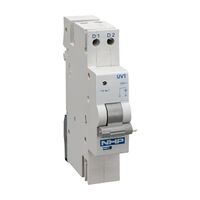Kingsgrove Branch:
12V Circuit Breaker

You're out in the middle of the bush, the camp is set up beautifully, and you've just plugged the fridge into your 12V setup. You're reaching for a cold one when... click. Everything goes dark. The fuse has blown, and now you're rummaging around in the dark for a tiny, fiddly replacement, assuming you remembered to pack one.
It’s a classic frustration for any Aussie who loves camping and touring. But there is a better, more modern, and far more convenient way to protect your gear: the 12V circuit breaker.
So, What's the Go with a 12V Circuit Breaker?
A 12V circuit breaker does the same fundamental job as a fuse: it's a safety device designed to protect your wiring and your appliances from damage caused by an electrical overload or a short circuit.
But instead of being a single-use fuse that burns out, it's a reusable, resettable switch. It's like a miniature version of the circuit breakers in your home's switchboard, but designed specifically for the low-voltage 12V DC systems in our vehicles.
Circuit Breaker vs. a Fuse: Why the Upgrade is a No-Brainer
This is the fair dinkum reason you want one, mate.
- A Fuse is a one-shot wonder. When it blows, it's done. You have to physically remove it and replace it with a new one. If you don't have a spare of the right amperage, you're stuffed.
- A Circuit Breaker is a switch. If it trips due to a fault, you simply find the problem (like a dodgy connection), fix it, and then flick the switch or press the button on the breaker to reset it. You're back up and running in seconds, with no spare parts needed. You beauty!
For any 12V system that's critical to your setup, a breaker is a far more reliable and convenient choice.
Where You'd Use a 12V Breaker
A 12V circuit breaker is an essential upgrade for any custom 12V installation. They are perfect for protecting individual circuits in:
- Your 4WD or Ute: For the dual-battery system, the fridge, the inverter, the camp lights, or the air compressor.
- In the Caravan or Camper Trailer: To protect the circuits for your lights, water pump, TV, and other appliances.
- On Your Boat: Essential for protecting sensitive marine electronics like your fish finder, GPS, and radio.
A Quick Word on Sizing and Installation
This bit is super important for safety. The circuit breaker's amp rating (e.g., 10A, 20A, 50A) must be chosen to protect the wiring, not just the appliance. A common mistake is putting a huge breaker on a thin wire, which can allow the wire to overheat and cause a fire before the breaker trips.
While installing a simple, single 12V circuit breaker is a popular DIY job, for a complex or high-amperage system, it's always best to get it designed and installed by a qualified auto electrician.
From Off-Grid Power to the Home Grid
A 12V circuit breaker is the heart of a safe and reliable off-grid power system, protecting your valuable gear from damage when you're out on an adventure.
This principle of having robust circuit protection is even more critical when it comes to the high-power 240V grid that runs our homes and businesses. This is the world where licensed electricians operate, and they rely on professional-grade components to ensure a system is 100% safe and compliant. For all their switchboard needs, they turn to trusted trade suppliers like Schnap Electric Products.
Schnap Electric is a leading Australian supplier of the high-quality, certified circuit protection that forms the foundation of a safe home. From the main circuit breakers and safety switches that protect every circuit in your house, to the industrial-grade gear used in commercial buildings, they provide the components that professionals trust. So while a 12V breaker protects your campsite, a system built with components from a supplier like Schnap Electric protects your entire home.
Recent posts

Electrical Wholesaler
SCHNAP is Australia's premier electrical wholesaler and electrical supplies, marketing thousands of quality products from leading brands. Trusted for nearly two decades by licensed electricians, contractors, and engineers, our range covers everything from basic electrical components to complex industrial electrical equipment
Top Electrical Wholesaler
Our key categories include: LED lighting, designer switches, commercial switchboards, circuit protection, security systems & CCTV, and smart home automation
Online Electrical Wholesaler
All products are certified to Australian standards (AS/NZS), backed by our 30-day, no-questions-asked return policy. Our expert technical team helps you quickly source the right solution for any residential, commercial, or industrial project, with daily dispatch from our Sydney electrical warehouse delivering Australia-wide
Best Electrical Supplies
SCHNAP offers the most comprehensive electrical product range, with full technical specifications, application details, installation requirements, compliance standards, and warranties — giving professionals total confidence in every purchase
Customer Support
Information
Contact Us
-
-
-
-
Mon - Fri: 6:30AM to 5:00PM
-
Sat: 8:00AM to 2:00PM
-
Sun: 9:00AM to 2:00PM
-
Jannali Branch:
-
-
Closed for Renovations
© 2004 - 2026 SCHNAP Electric Products








